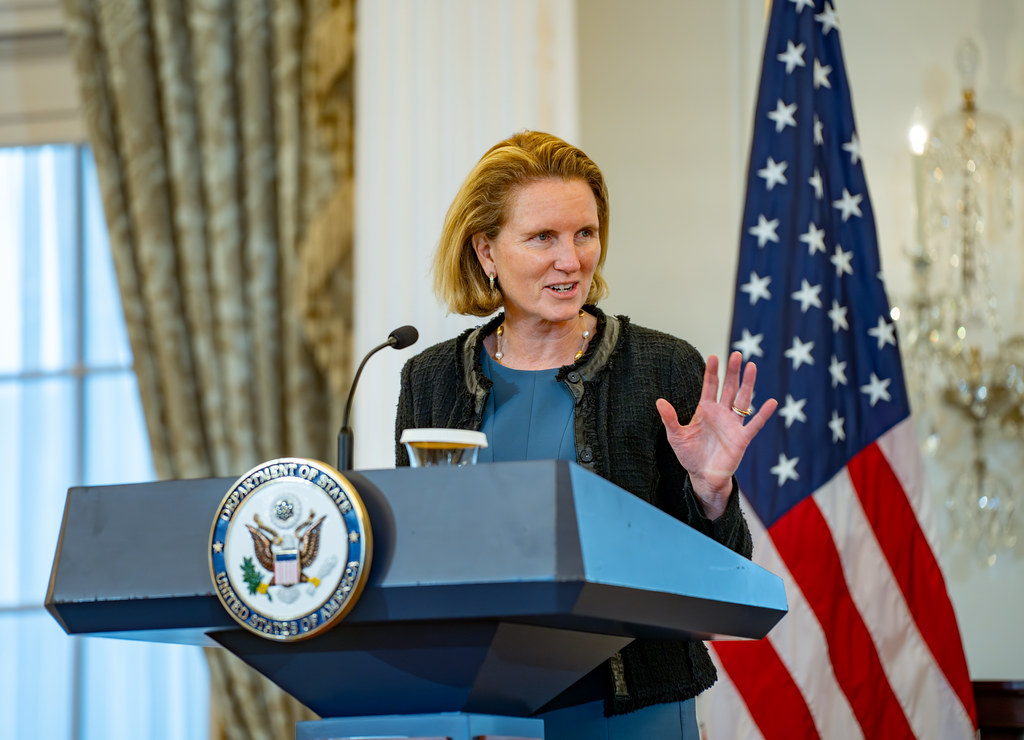Washington, DC
April 17, 2024
ADMINISTRATOR SAMANTHA POWER: Thank you so much, Ambassador [Oksana Markarova]. Couldn’t agree more with the Prime Minister [Denys Shmyhal] and his words about you. Great person, great place. We hope this week, especially, if this national security supplemental goes through [inaudible]. And I want to join you in thanking the members of the U.S. government team. You mentioned Ambassador – Assistant Administrator [Erin] McKee, Mark Simakovsky, I also see Maria Longi here.
We have an incredible team between State and USAID that really became only more incredible when Penny Pritzker came back into government service and to answer the call. We were so lucky, Penny, to have you on the team, not least because it keeps us focused on the future, and not just the hellish presence that Putin is subjecting Ukrainian people to, but really looking ahead as to the tragic trajectory of this country, whose people have proven their capabilities again and again.
Of course, Ambassador Makarova, former finance minister, Mr. Prime Minister, you understand that it is largely due to your government’s efforts that we are in a position today to make a number of new announcements. What we’re going to announce today wouldn’t be possible but for you all continuing reform effort despite the brutality of the attacks that had intended, of course, to terminate the cause of democratic reform and economic integration. Instead, it has accelerated that effort, which is some irony, but really a tribute to all of you. And, Mr. Prime Minister, since you oversee, again, all of the ministries involved in creating the conditions and make initiatives like the ones we’re here to announce possible, it’s really a tribute to you and your team. And so please extend our thanks to them.
So, as we all know, Putin is not just attacking Ukraine’s armies, not just attacking Ukraine’s civilians, its children, but he’s also very, very intentionally from day one in trying to destroy Ukraine’s economy. He has attempted to sabotage Ukrainian industry, as we know, by attacking the electric grid, bombing key production facilities, trying to destroy the agricultural sector – one of Ukraine’s largest export sectors, of course. Blowing up grain silos, putting landmines in fields to prevent the farming of Ukraine’s rich and arable land. And, of course, for so long bombarding Ukraine’s ports to try to prevent Ukrainian farmers from doing what they had always done, which is exporting their goods to the world and helping feed the world. But the fact is, in the fight to destroy Ukraine’s economy, a major goal for President Putin, Putin is losing ground. It’s just – he is really losing ground.
Ukrainian companies have shifted their operations, transformed their supply chains, and changed their locations, of course. Industries, like IT, have not only survived but thrived. For example, even during the war, Ukraine has expanded its leadership in cutting edge industries like artificial intelligence, fintech, and blockchain. Is that something that Putin would have expected? In the two years before the war, the sector contributed $11.8 billion to Ukraine’s economy. In the two years since Putin’s full-scale invasion, that sector contributed $14 billion to Ukraine’s economy.
Companies like Bayer, Louis Dreyfus Company, and Corteva are making investments now, not only because they are committed to Ukraine’s recovery, but because they see real business opportunities in Ukraine. The economy grew last year and is projected to grow again, even as the Kremlin’s attacks not only continue but really intensify.
Given the relentlessness of Putin’s missile and drone assaults, this is a staggering achievement. And I will say I had a conversation not long ago with Kristalina Georgieva of the IMF, and she was literally, almost breathless in describing the economic miracle that the Ukrainian people and leadership have helped bring about. I mean, just to have this level of economic growth with these kinds of conditions inflicted upon the people of Ukraine, it’s really something that will be studied for a long time to come.
But all that said, a major barrier is still standing in the way of progress for many Ukrainian companies, and that is access to capital. One of Ukraine’s largest investors, Igor Lipski, has invested in a wide range of sectors in the Ukrainian economy. Right now, he’s trying to build a windowpane factory to replace the shattered windows across the country. But while he is ready to invest a third of what is needed, just one example, he’s having trouble raising capital for the remainder. He says, “the biggest problem is not people, technology or equity, the biggest problem is to raise project finance.” Imagine if one ultimately stands in the way of Ukraine’s economic progress is not attacks from a vicious invader but a lack of investment from its friends. We are here today to make sure that does not happen, and I’m glad to share two initiatives with Nasdaq and the Bank of America to help Ukrainian businesses not only withstand the war, but again, to grow and to thrive.
The first, which will be elaborated upon, is an exciting partnership with Nasdaq. You’ll hear more about from Vice Chairman Edward Knight, to help Ukrainian businesses get access to the capital they need. Currently, Ukrainian stock exchanges are not developed enough to provide liquidity for Ukrainian companies during the war. So, the next viable way for these companies to access capital is to list on the international markets, but there’s a cost to listing on the international capital markets, including initial listing fees and annual fees, costs that can be prohibitive for companies that are already having to grapple with air raids, power outages and supply chain issues as they grow.
That is why Nasdaq is making this crucial commitment to waive fees for Ukrainian companies to list on the Nasdaq stock exchanges globally. As Vice Chairman Knight will detail, they are also providing technical assistance to help Ukrainian businesses navigate the requirements of listing on the exchanges, as well as offering Ukrainian entrepreneurs workshops, training, and advice on regulation and governance practices of public companies – this is a major initiative.
Secondly, you will hear from Bernie Mensah from Bank of America about an exciting partnership between the Government of Ukraine and Bank of America to provide senior investment bankers expertise to the Ukrainian Ministry of the economy through a process known as secondments – a familiar bureaucratic term – to assist in developing, planning and executing projects. These so-called secondees from the Bank of America, who work with the Ministry of Economy, are going to identify, and with their Ukrainian colleagues, and build out bankable projects in Ukraine and then help pitch them to the appropriate investors. It will send a strong signal that Bank of America, one of the largest banks in the world, knows there is real opportunity to invest in Ukraine now and is eager to help financial institutions to take advantage of those opportunities.
We encourage other companies here tonight to also think creatively. These are two very different initiatives where each entity, institution thinks through what are our comparative advantages to contribute here? Each company can think creatively about how they can support Ukraine’s economy at this critical juncture, and how we and the U.S. government can help facilitate those efforts.
In an era where democracy is under attack, investing in Ukraine’s economy and in its stability is one of the most impactful ways the private sector can join the fight. I want to thank Nasdaq, I want to thank the Bank of America for these vital efforts. We are honored to stand with them as we stand with Ukraine.
Thank you so much.

